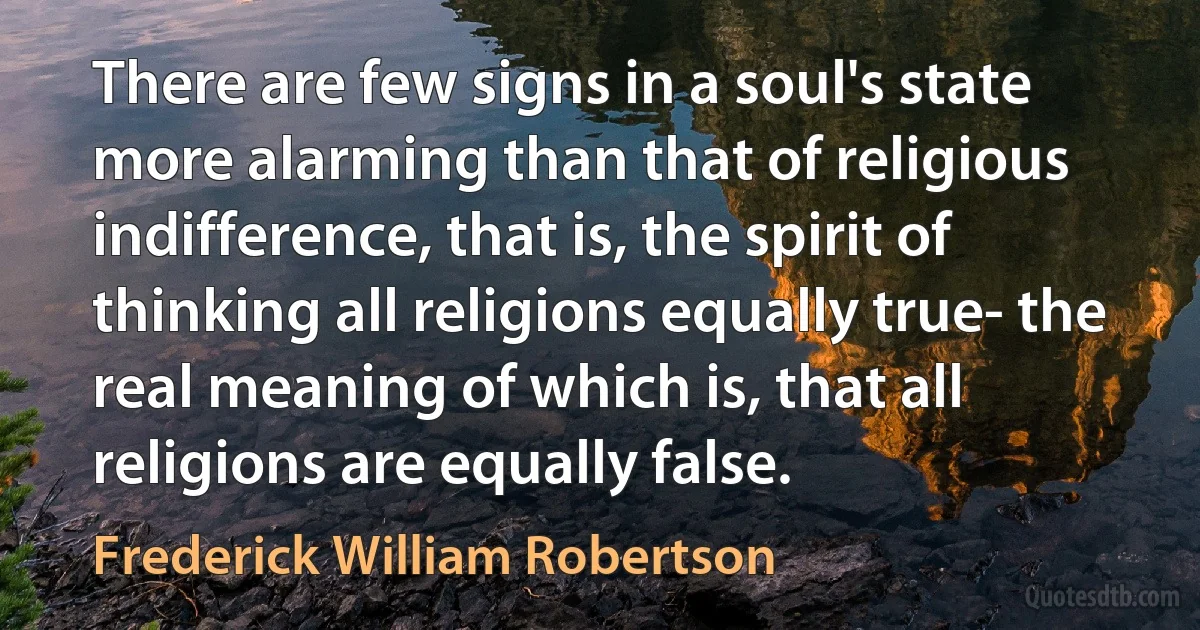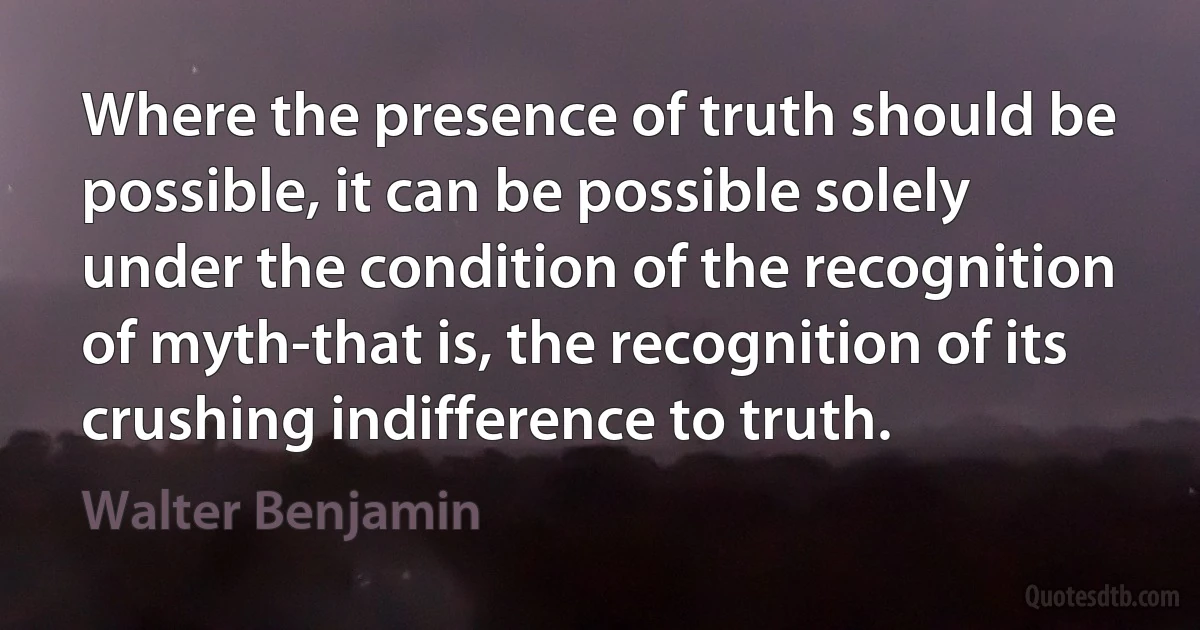Indifference Quotes - page 9
There are people whose mind would recoil from actual negation, but who have no objection to complete indifference; and it is this that is the most to be feared, for, to deny something, one must think about it to some extent, however little that may be, whereas an attitude of indifference makes it possible not to think about it at all.

René Guénon
Doing nothing is not the absence of a policy; it is, in fact, the adoption of one. "Neutrality" favors the side with the biggest arsenal. "Nonintervention" is a form of interference. If you will the end-and President Barack Obama has finally said that Qaddafi should indeed go-then to that extent you will the means...The immediate task is therefore to limit the amount of damage Qaddafi can do and sharply minimize the number of people he can murder. Whatever the character of the successor system turns out to be, it can hardly be worsened if we show it positive signs of friendship and solidarity...I am sure I am not alone in feeling rather queasy about being forced to watch the fires in Tripoli and Benghazi as if I were an impotent spectator. Indifference of this kind to the lives of others can have a coarsening effect. It can lower one's threshold of sympathy. If protracted unduly, it might even become brutalizing.

Christopher Hitchens
I was... told by a person who had known him [future Emperor Nicholas II] intimately from his childhood, that, though courteous, his main characteristic was an absolute indifference to most persons and things about him, and that he never showed a spark of ambition of any sort. This was confirmed by what I afterward saw of him at court. He seemed to stand about listlessly, speaking in a good-natured way to this or that person when it was easier than not to do so; but on the whole, indifferent to all which went on about him. After his accession to the throne, one of the best judges in Europe, who had many opportunities to observe him closely, said to me, "He knows nothing of his empire or of his people; he never goes out of his house, if he can help it." This explains in some degree the insufficiency of his program for the Peace Conference at The Hague and for the Japanese War, which, as I revise these lines, is bringing fearful disaster and disgrace upon Russia.

Andrew Dickson White
The person who is dedicated to nonviolence is more active than anyone, because he does not only want to overcome indifference and hatred, weariness and egoism within himself, but he wants to overcome anything which divides and hurts all people and therefore the person dedicated to nonviolence does not accept society as it is.

Aldo Capitini
Every death even the cruellest death
drowns in the total indifference of Nature
Nature herself would watch unmoved
if we destroyed the entire human race
I hate Nature
this passionless spectator this unbreakable iceberg-face
that can bear everything
this goads us to greater and greater acts.

Peter Weiss
As for myself, I confess to a preference for clear-cut situations, for radical and even extreme positions. But I also feel a secret and very strong attraction to ambiguous situations... for example, that hovering moment when it is no longer day and not yet night, the shades of emotion between indifference and friendship... (they) are so fascinating because they are so indefinable. That which is pure transition, is all the more appealing to the mind because of its elusiveness. It is the same in the cases of Mondrian, Kandinsky and the Cubists: abstraction and figuration have a common frontier in their work that is so tenuous that we often do not know which side we are on. It is this ambiguity that imports a rare poetic charm to their paintings. Artists like Klee, Miro and Dubuffet have also pitched their tents on this borderline and constantly travel from one side tot the other.

Michel Seuphor
In the first place, there is the Hitler group, among whom are the most guilty of the defendants and about whom very little, if any, good can be spoken. By the Hitler group I include Göring, Ribbentrop, Kaltenbrunner, Keitel, Rosenberg, Frank, and Streicher. Then there is the group which one might call idealistic. Unfortunately, too many of us were indifferent. Not many belonged to the idealistic group, and I don't care to name them because I think I would be stretching a point to call any of the defendants idealists. I feel that perhaps of all the defendants I was the only idealist, although I suffered from blindness and indifference myself. In this respect, I am not like Speer, Schirach, and Funk. Schacht I consider an opportunist.

Hans Fritzsche
A point which I want very much to establish is that the choice of these 'Readymade' was never dictated by aesthetic delectation. This choice was based on a reaction of visual indifference with at the same time a total absence of good or bad taste.... in fact a complete anesthesia. One important characteristic was the short sentence which I occasionally inscribed on the 'readymade'. That sentence instead of describing the object like a title was meant to carry the mind of the spectator towards other regions more verbal.

Marcel Duchamp
Basically, I exploited the phenomenon of the technician's often blind devotion to his task. Because of what seems to be the moral neutrality of technology, these people were without any scruples about their activities. The more technical the world imposed on us by the war, the more dangerous was this indifference of the technician to the direct consequences of his anonymous activities.

Albert Speer
The Great Commandment demands of everyone the total love of God and the love one's neighbour according to the measure of man's natural self-affirmation. If love is emotion, how can it be demanded? Emotions cannot be demanded. We cannot demand them of ourselves. If we try, something artificial is produced which shows the traits of what had to be suppressed in its production. Repentance, intentionally produced, hides self-complacency in perversion. Love, intentionally produced, shows indifference or hostility in perversion. The means: love as an emotion cannot be commanded. Either love is something other than emotion or the Great Commandment is meaningless.

Paul Tillich
Even Plato assumes that the genuinely perfect condition of man means no sex distinction (and how strange this is for people like Feuerbach who are so occupied with affirming sex-differentiation, regarding which they would do best to appeal to paganism). He assumes that originally there was only the masculine (and when there is no thought of femininity, sex-distinction is undifferentiated), but through degeneration and corruption the feminine appeared. He assumes that base and cowardly men became women in death, but he still gives them hope of being elevated again to masculinity. He thinks that in the perfect life the masculine, as originally, will be the only sex, that is, that sex-distinction is a matter of indifference. So it is in Plato, and this, the idea of the state notwithstanding, was the culmination of his philosophy. How much more so, then, the Christian view.

Søren Kierkegaard
[...] and you, my compatriots in Norway, have no grounds for complaining that we have forgotten the dear, familiar and specific character with which God has endowed our land and our nation. That is so firmly entrenched in our being that it finds expression, whether we like it or not. Do not, therefore, insult us further with such [an accusation]; it hurts our feelings, and thereby proves how unfounded it is, for otherwise it would be easy to treat it with indifference.

Hans Gude



